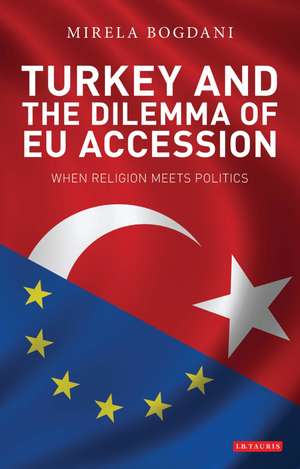Turkey and the Dilemma of EU Accession: When Religion Meets Politics
Autor Mirela Bogdanien Limba Engleză Paperback – 29 sep 2010
Preț: 171.79 lei
Preț vechi: 191.67 lei
-10% Nou
Puncte Express: 258
Preț estimativ în valută:
32.88€ • 33.92$ • 27.82£
32.88€ • 33.92$ • 27.82£
Carte disponibilă
Livrare economică 11-25 februarie
Preluare comenzi: 021 569.72.76
Specificații
ISBN-13: 9781848854598
ISBN-10: 1848854595
Pagini: 240
Ilustrații: 1 map
Dimensiuni: 138 x 216 x 20 mm
Greutate: 0.32 kg
Editura: Bloomsbury Publishing
Colecția I.B.Tauris
Locul publicării:London, United Kingdom
ISBN-10: 1848854595
Pagini: 240
Ilustrații: 1 map
Dimensiuni: 138 x 216 x 20 mm
Greutate: 0.32 kg
Editura: Bloomsbury Publishing
Colecția I.B.Tauris
Locul publicării:London, United Kingdom
Notă biografică
Mirela Bogdani is a specialist on EU issues with a focus on EU enlargement. She has studied politics at St Antony's College, Oxford University and taught at the School of European Studies, Cardiff University.
Cuprins
Chapter 1: Revival of religion in world and European politics1.1. Religion and politics: the relationship between the two and the impact of religion on politics1.2. Return of religious discussion to world and European politics1.3. Secularisation Theory, Desecularisation Thesis and European ExceptionalismChapter 2: Turkey and the EU2.1. EU eastward enlargement 2.2. History of Westernisation of Turkey and of its relations with the EU2.3. Formal obstacles: domestic political and economic factors and other (Cyprus, Kurdish and Armenian) issues2.4. Semi-formal obstacles: geography, demography, security and institutional factors2.5. Informal obstacles: religious and cultural factorsChapter 3: Compatibility of Islam with democracy 3.1. Muslim and Western values: Are they in harmony or do they conflict?3.2. Is Islam compatible with liberal-democracy? 3.3. Issue of secularism: Relation of Islam and Christianity with the state3.4. An Islamic Reformation: Is this necessary or possible? 3.5. Can Turkey maintain a balance between secular democracy and Islamic culture?Chapter 4: What place do religion and culture have in the debate on Turkey's candidacy?4.1. Religion and culture: two separate concepts?4.2. European identity4.3. Actors in the debate: 4.3.1. European citizens 4.3.2. EU institutions 4.3.3. EU member-states 4.3.4. EU leaders and politiciansChapter 5: Reasons for the increase of European opposition since 20015.1. The rise of Islamic fundamentalism around the world and its implications for Europe5.2. The increase of the Muslim population in Western Europe and the integration issue5.3. Fear of Islamisation of Europe5.4. Prospect of a country of 70 million Muslims becoming part of the EU5.5. Political Islam as part of Turkey's mainstream politicsConclusions
